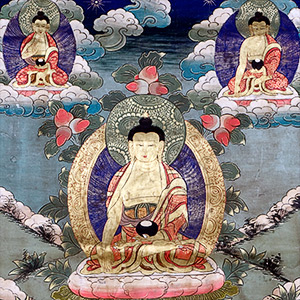 Dan Arnold is a scholar of Indian Buddhist philosophy, which he engages in a philosophically constructive and comparative way. His first book, Buddhists, Brahmins, and Belief: Epistemology in South Asian Philosophy of Religion (Columbia University Press, 2005), won an American Academy of Religion Award for Excellence in the Study of Religion. His second book, Brains, Buddhas, and Believing: The Problem of Intentionality in Classical Buddhist and Cognitive-Scientific Philosophy of Mind(Columbia University Press, 2012), centers on the contemporary philosophical category of intentionality, taken as useful in thinking through central issues in classical Buddhist epistemology and philosophy of mind. This book received the Toshihide Numata Book Prize in Buddhism, awarded by the Center for Buddhist Studies at the University of California, Berkeley. He is presently working on an anthology of Madhyamaka texts in translation, to appear in the series “Historical Sourcebooks in Classical Indian Thought.”
Dan Arnold is a scholar of Indian Buddhist philosophy, which he engages in a philosophically constructive and comparative way. His first book, Buddhists, Brahmins, and Belief: Epistemology in South Asian Philosophy of Religion (Columbia University Press, 2005), won an American Academy of Religion Award for Excellence in the Study of Religion. His second book, Brains, Buddhas, and Believing: The Problem of Intentionality in Classical Buddhist and Cognitive-Scientific Philosophy of Mind(Columbia University Press, 2012), centers on the contemporary philosophical category of intentionality, taken as useful in thinking through central issues in classical Buddhist epistemology and philosophy of mind. This book received the Toshihide Numata Book Prize in Buddhism, awarded by the Center for Buddhist Studies at the University of California, Berkeley. He is presently working on an anthology of Madhyamaka texts in translation, to appear in the series “Historical Sourcebooks in Classical Indian Thought.”
Among Naomi Quinn’s publications, she is co-author (with Claudia Strauss) of A Cognitive Theory of Cultural Meaning (1997), editor of Finding Culture in Talk (2005) and co-editor (with Jeannette Mageo) of Attachment Reconsidered: Cultural Perspectives on a Western Theory (2013). She is a past president of the Society for Psychological Anthropology and was awarded that society’s 2009 Lifetime Achievement Award.
Eric Schwitzgebel has written extensively on self-knowledge (he argues that we don’t have much of it), on the nature of attitudes (he argues that attitudes are expressed in your choices more than in the words that come out of your mouth), and on moral psychology (especially the not-particularly-good moral behavior of professional ethicists). He has also written a little bit on classical Chinese philosophy. His most recent book is Perplexities of Consciousness.
Kwong-loi Shun has been a professor of philosophy and an academic administrator at the University of California at Berkeley, University of Toronto, and the Chinese University of Hong Kong. His main research interests are in moral psychology and Confucian ethics, and he is currently working on a multi-volume project in these areas.
Nina Strohminger holds a bachelor’s degree in cognitive science from Brown University and a doctorate in psychology from the University of Michigan, Ann Arbor. She is 70 percent psychologist, 20 percent philosopher, and 10 percent miscellaneous.
Robin Wang is the author of Yinyang: The Way of Heaven and Earth in Chinese Thought and Culture (Cambridge University Press, 2012), the editor of Chinese Philosophy in an Era of Globalization, (SUNY Press, 2004) and Images of Women in Chinese Thought and Culture: Writings from the Pre-Qin Period to the Song Dynasty (Hackett, 2003). She has published many articles and essays and regularly given presentations in North America, Europe, and Asia. She has also been a consultant for the media, law firms, museums, K-12 educators, and health care professionals, and was a credited Cultural Consultant for the movie Karate Kid, 2010.

